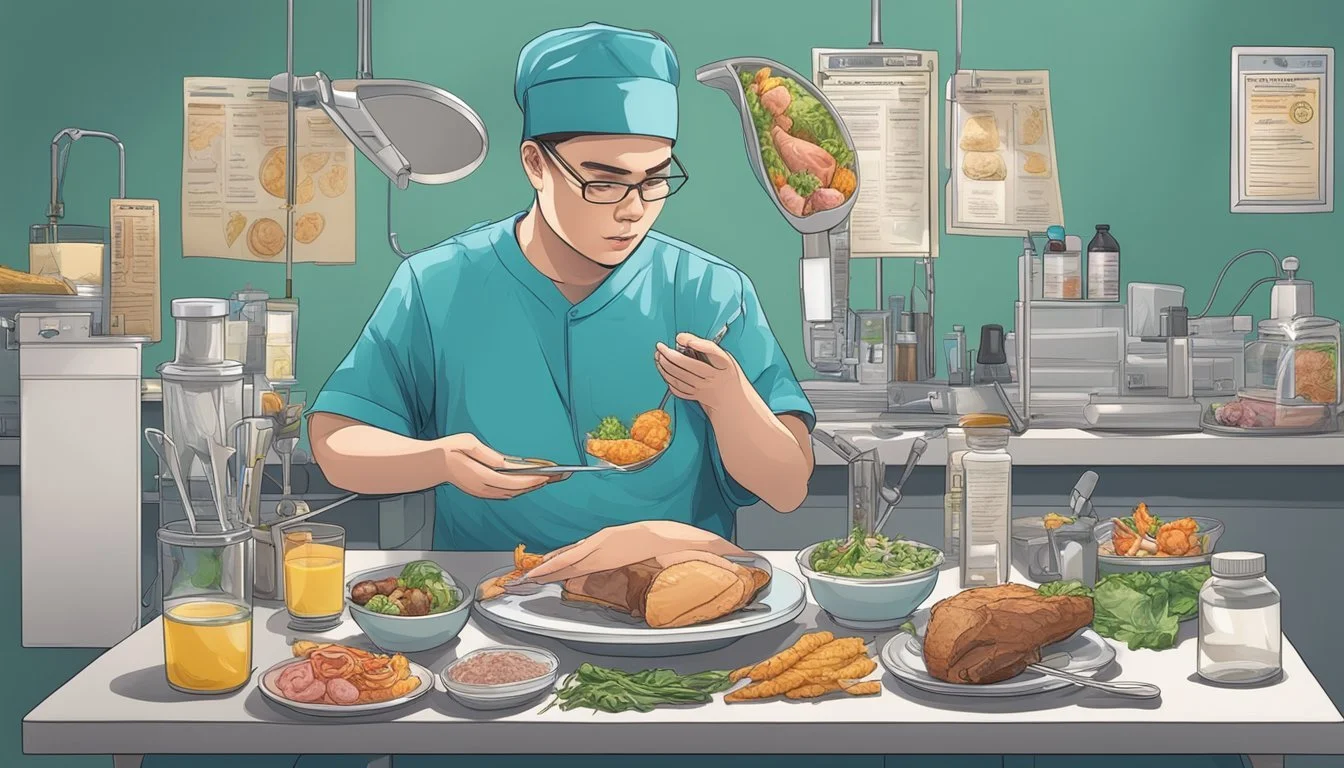Carnivore Diet and Post-Surgery Recovery
Evaluating Healing Benefits
The role of diet in recovery after surgery is a topic of growing interest, particularly as individuals search for strategies to optimize healing. The carnivore diet, which consists mainly or exclusively of animal products, has been reported by some as beneficial during the postoperative period. Proponents of this dietary pattern claim improvements in inflammation markers, body composition, and overall recovery outcomes. The diet's high protein content, a crucial macronutrient for wound healing, and the purported reduction in inflammatory responses from eliminating plant-based foods are often cited as key advantages.
However, the carnivore diet's efficacy and safety in the context of post-surgical healing is not without controversy. While anecdotal evidence suggests some patients experience positive outcomes, the lack of comprehensive clinical studies on the carnivore diet's role in postoperative care leaves room for skepticism among healthcare professionals. The diet's restrictive nature raises questions about its potential impacts on long-term nutritional status and gut microbiota, important considerations for anyone recovering from surgery.
It is essential for individuals considering the carnivore diet for surgical recovery to weigh the potential benefits against the risks. Collaboration with healthcare providers, including dietitians and surgeons, can ensure that dietary choices support optimal healing and general health. As the scientific community continues to investigate the mechanisms behind diet-induced recovery, it is critical that recommendations are based on established evidence to guide patients safely through their postoperative journey.
Carnivore Diet: An Overview
Exploring the carnivore diet reveals a nutritional strategy centered around animal-based foods and protein-rich sources such as meat and fish. This section provides a thorough examination of what the diet entails and its position in both historical and contemporary contexts.
What Is the Carnivore Diet?
The carnivore diet is a high-protein, low-carbohydrate diet that comprises exclusively or primarily of animal products and is devoid of plant-based foods. It emphasizes the consumption of meat, beef, poultry, fish, and other animal products while excluding fruits, vegetables, grains, and nuts. Proponents believe that focusing on animal products provides all the necessary nutrition and fosters health benefits, although it's a subject of debate among nutritionists. Typically, the diet includes:
Meats: Including but not limited to beef, pork, lamb, chicken, and turkey.
Fish: Fatty fish like salmon, which is rich in omega-3 fatty acids, is often encouraged.
Animal fats: Lard, tallow, butter, and ghee are sources of fat on this diet.
Eggs: A staple item providing essential vitamins and minerals.
Low-lactose dairy: Some variations allow for hard cheeses and heavy cream.
The carnivore diet is often compared to the ketogenic diet, as both emphasize low carbohydrate intake and high fat and protein. However, the ketogenic diet includes some plant-based foods.
Trust me, the easiest way to buy lard, tallow, or ghee is through online retailers!
Historical Context and Recent Popularity
Historically, indigenous groups, such as the Inuit, consumed similar diets out of necessity, owing to limited plant food availability. These ancestral eating patterns serve as a reference point for the diet's viability. In recent years, the carnivore diet gained traction, partly propelled by personalities like Dr. Shawn Baker, an advocate for the diet who claims numerous health benefits due to its simplicity and nutrient density.
The diet has surged in popularity with those seeking a radical shift from standard Western dietary patterns which are often high in processed foods. Its increased visibility in books, social media, and podcasts has contributed to a growing community of followers who assert that the diet aids in weight loss, mental clarity, and even the alleviation of certain chronic ailments. However, it is essential to take into account that while anecdotal evidence exists, comprehensive scientific studies are needed to understand the diet's long-term health implications fully.
Understanding the Role of Nutrition in Post-Surgery Healing
Proper nutrition is vital for healing after surgery. It provides the building blocks necessary for tissue repair and immune function, and influences the speed and effectiveness of the recovery process.
Essential Nutrients for Recovery
Nutrients play a pivotal role in post-surgery healing, each serving a specific function in recovery. Proteins are fundamental for tissue repair and immune responses. Vitamins and minerals are essential for enzymatic reactions and collagen synthesis, with vitamin C, iron, and zinc being particularly important. Here is a list of key nutrients and their roles:
Protein: Essential for cell repair and immune function.
Vitamin C: Crucial for collagen production and immune defense.
Zinc: Supports wound healing and immune system efficiency.
Iron: Integral for oxygen transport and energy production.
When it comes to vitamin C, zinc, and iron supplement, online shopping is the way to go!
The Impact of Diet on Wound Healing
Diet directly affects wound healing. A diet lacking in necessary macronutrients and micronutrients can lead to delayed healing and infection. Conversely, a diet rich in critical nutrients supports timely and effective healing. Collagen production, a key element of wound healing, is especially nutrient-dependent. Vitamin C and protein, for instance, are two nutritional components that can significantly impact collagen synthesis and, therefore, the healing of surgical wounds.
Protein and Collagen Synthesis
Post-surgery, the body has an increased demand for protein to rebuild damaged tissues and produce collagen—the main structural protein in wound repair. Amino acids, the building blocks of protein, are essential for the production of new tissue and collagen. Including high-quality protein sources in a post-operative diet is imperative for optimal recovery. Vitamin C also has a vital role in this process, acting as a co-factor in collagen synthesis, enhancing tissue repair and helping to maintain the health and function of scar tissue.
Analyzing the Benefits of the Carnivore Diet for Post-Surgery Patients
After surgery, patients may seek dietary strategies to optimize healing. The carnivore diet, being high in protein, may offer benefits such as reducing inflammation and bolstering the immune system, key factors in postoperative recovery.
Reduction of Inflammacy
The carnivore diet eliminates plant-based foods, which for some individuals, may reduce the intake of potential dietary irritants that can cause inflammation. It is primarily focused on meat consumption, which is rich in omega-3 fatty acids, especially from sources like salmon and other fatty fish. Omega-3 fatty acids have been shown to have anti-inflammatory properties. Patients following a carnivore diet may experience a decrease in inflammation, aiding in a more efficient and potentially quicker healing process after surgery.
Strengthening the Immune System
Protein intake is critical for the immune system's functionality. The carnivore diet is essentially a high-protein diet that supplies ample amino acids, which are the building blocks needed to repair tissue and strengthen the immune response. Additionally, many meats provide essential nutrients such as zinc and vitamin B12, which play vital roles in maintaining a healthy immune system. By emphasizing these nutrient-rich foods, post-surgery patients could see a positive impact on their overall immune health, contributing to better postoperative outcomes.
Carnivore Diet and Its Influence on Surgery Recovery
The focus of this section is to detail how a carnivore diet, with its high protein and potential impact on energy levels, might influence recovery post-surgery.
Protein Intake and Muscle Repair
Protein is a crucial nutrient for muscle repair and strength recovery following surgery. A carnivore diet, which is predominantly meat-based, inherently provides a high intake of complete proteins. These proteins furnish the body with essential amino acids that are vital for tissue repair and muscle regeneration. Patients on a carnivore diet may experience efficient muscle recovery post-surgery due to the diet's emphasis on protein-rich foods such as beef and poultry.
Energy Levels and Healing
A carnivore diet can influence energy levels during the healing process. Post-surgery, the body requires an abundant and steady supply of calories for energy to fuel the healing process. Foods in a carnivore diet are dense in nutrients and calories, which can help maintain energy levels. However, patients should be aware of the diet's potential limitation in providing certain nutrients found in plants, and consult with healthcare professionals to ensure a balanced intake is maintained for optimal recovery.
Potential Risks and Considerations
While the carnivore diet eliminates certain food groups, it is critical to understand potential nutritional deficiencies and long-term health consequences, especially in the context of healing after surgery.
Vitamin and Mineral Deficiencies
Adherence to a carnivore diet may result in vitamin and mineral deficiencies due to the exclusion of plant-based foods. Key nutrients that are often lacking include:
Vitamins: Particularly Vitamin C and some B vitamins not abundantly found in animal products.
Minerals: Such as calcium and magnesium, which are less prevalent in a carnivore diet.
Fiber: Animal products do not contain fiber, which is essential for digestive health and may impact bowel function during post-operative recovery.
These deficiencies could potentially compromise wound healing and immune function, increasing the risk of infection and complications after surgery.
Long-Term Health Implications
A long-term carnivore diet might affect overall health. Points of concern include:
Heart Health: High intake of saturated fats from animal products can elevate cholesterol levels, increasing heart disease risk.
Diabetes: While a low-carbohydrate diet may initially control blood sugar, the long-term effects on insulin sensitivity are not fully known.
Inflammation: Some studies suggest that excessive consumption of red meat (What wine goes well with red meat?) may contribute to systemic inflammation, which is counterproductive to healing post-surgery.
One must weigh these factors carefully, especially when considering the body's demands for recovering from surgery.
Comparative Analysis of Diets in Surgical Recovery
This section provides an in-depth comparison between the carnivore diet and other dietary patterns regarding their impact on healing post-surgery.
Carnivore vs. Omnivore Diets
The carnivore diet is characterized by a consumption exclusively of animal products, emphasizing high protein and fat intake with practically zero carbohydrates. Post-surgery, this diet may support tissue repair due to its high protein content. However, the absence of fiber, found in plant-based foods, might impede optimal gastrointestinal function and can lead to constipation, a common concern after surgery.
Omnivore diets include both animal and plant sources, offering a balanced intake of protein, essential fats, fiber, vitamins, and minerals. The varied nutrient profile assists in comprehensive health and recovery, aiding wound healing and potentially reducing the risk of complications such as infections.
Nutrient Comparison: Carnivore Diet vs. Omnivore Diet
Protein
Carnivore Diet: High (primarily from animal meat and products)
Omnivore Diet: Moderate-High (from both animal and plant sources)
Fiber
Carnivore Diet: None (animal products do not contain dietary fiber)
Omnivore Diet: Moderate-High (from fruits, vegetables, legumes, and whole grains)
Vitamins & Minerals
Carnivore Diet: Varied depending on the types of animal products consumed; some may be high (e.g., Vitamin B12, Iron from red meat), while others may be lacking (e.g., Vitamin C, Fiber)
Omnivore Diet: Wide variety due to inclusion of both animal and plant-based foods, offering a more balanced intake of essential nutrients.
Carnivore vs. Plant-Based Diets
A plant-based diet consists mainly of vegetables, fruit, grains, nuts, and seeds. It tends to be high in dietary fiber, enhancing gut health which is crucial in the postoperative period. The presence of various antioxidants in this diet may aid in reducing inflammation, thus potentially accelerating the healing process. Contrastingly, it may require careful planning to ensure adequate protein intake vital for repair and recovery.
Conversely, the carnivore diet might lead to quicker satiety due to the high fat and protein content and may support glycemic control, which is beneficial for patients, particularly those with diabetes. However, exclusively animal-based diets lack some essential nutrients readily available in a plant-based diet that contribute to overall health and post-surgical recovery.
Dietary Factors: Carnivore Diet vs. Plant-Based Diet
Protein
Carnivore Diet: High
Plant-Based Diet: Variable (depends on sources like legumes, nuts, seeds, and soy)
Fiber
Carnivore Diet: None
Plant-Based Diet: High (due to intake of fruits, vegetables, whole grains, and legumes)
Antioxidants
Carnivore Diet: Low (mainly from animal sources, which are less abundant)
Plant-Based Diet: High (plentiful in fruits, vegetables, nuts, and seeds)
Glycemic Control
Carnivore Diet: Potentially better due to very low to no carbohydrate intake
Plant-Based Diet: Variable (can be optimized with whole foods and low-glycemic index choices)
In summary, while the carnivore diet provides significant protein which is important for healing, the lack of diversity in nutrients compared to omnivore and plant-based diets might not be optimal for recovery. Each diet has distinct properties that can influence health outcomes during the recovery phase after surgery.
Patient Success Stories and Anecdotal Evidence
The testimonies of individuals who have adopted the carnivore diet reveal a pattern of subjective health improvements, particularly emphasizing accelerated healing and recovery post-surgery.
Case Studies from Carnivore Diet Enthusiasts
Several enthusiasts report expedited recovery after surgical procedures, attributing their success to the high-protein content of the carnivore diet, which may aid in tissue repair and wound healing. Anecdotes often mention the diet’s elimination of plant foods, focusing solely on animal products such as meat, eggs, and dairy, to deliver robust energy levels and facilitate health improvements post-surgery.
Testimonial 1:
Name: Jane Doe
Surgery Type: ACL Reconstruction
Diet Duration: 6 months prior to surgery
Recovery Observations: Reduced inflammation and improved joint healing
Testimonial 2:
Name: John Smith
Surgery Type: Gallbladder Removal
Diet Duration: 3 months post-surgery
Recovery Observations: Swift return to daily activities with diminished digestive issues
Analysis of Subjective Reports
Though not scientifically substantiated, experts in the field have noted these subjective reports and encourage further investigation. The carnivore diet’s focus on consuming exclusively animal products means a high intake of protein, which is critical for the body’s healing processes post-surgery. However, the absence of other food groups leads to a cautionary stance from health professionals regarding its long-term sustainability and nutritional completeness. Surveys of personal recovery stories and testimonials help to illustrate patterns, but they lack the rigor of controlled studies.
Health Impact: Enhanced healing and energy levels
Dietary Components: High-protein, animal-based foods
Expert Opinion: Further research needed to substantiate claims
While individual success stories on the carnivore diet provide limited case-based evidence, they highlight the perceived benefits of a high-protein diet on surgical recovery, which is consistent with the recognized role of protein in health and healing.
Recommended Foods to Eat and Avoid Post-Surgery
After surgery, a patient's diet can significantly impact their recovery process. Specific foods can promote healing, while others may lead to complications or delayed recovery. Understanding which foods to include and which to avoid is crucial.
Foods that Facilitate Healing
High-Protein Foods: Protein is essential for wound healing and muscle repair. The patient's diet should include:
Lean Meats such as chicken or turkey
Fish, especially varieties rich in omega-3 fatty acids like salmon and tuna
Beans such as kidney beans; a half-cup serving contains 8 grams of protein
Eggs, as one large egg offers 6 grams of high-quality protein
Dairy Products, including low-fat milk or Greek yogurt to provide protein and calcium
Fruits and Vegetables: These are rich in vitamins, minerals, and antioxidants that support the immune system. One should incorporate:
Berries, such as blueberries and strawberries, loaded with vitamin C
Leafy Greens, like spinach, to provide iron and other essential nutrients
Potatoes, which supply vitamin C and carbohydrates for energy
Whole Grains: Consuming whole grains helps prevent muscle breakdown and maintains energy levels. Recommended options are:
Brown rice
Quinoa
Oatmeal
Foods Linked to Complications or Delayed Recovery
Foods High in Fat and Sugar: These can lead to constipation and may not provide the nutrients needed for healing. Therefore, one should limit or avoid:
Sugary sweets and drinks
High-fat meats
Full-fat dairy products
Spicy and Processed Foods: Spicy foods may irritate the digestive system, and highly processed foods usually lack essential nutrients, both of which can hinder recuperation.
Alcohol and Caffeine: These substances can dehydrate the body and potentially interfere with medication. The patient should avoid alcohol and limit caffeine intake during the recovery phase.
Strategies for Implementing the Carnivore Diet in Recovery
Incorporating the carnivore diet during the post-surgery period requires careful planning and monitoring to support the healing process and recovery. The focus must be on ensuring adequate intake of nutrients essential for repair and recovery.
Transitioning to a Carnivore Diet Post-Surgery
Immediate Post-Surgery: In the first few days following surgery, the focus should be on fluids and soft foods as they are easier to digest. Options include bone broths and well-cooked scrambled eggs, which can provide essential nutrients and hydration without overtaxing the digestive system.
Begin with easily digestible foods: Scrambled eggs, soft fish, and bone broth should be the first foods in the transition.
Gradually introduce solid meats: Soft-cooked meats like chicken or fish can follow, progressing to red meats as tolerance improves.
Monitoring and Adjusting the Diet for Optimal Healing
Nutrient Focus: Concentrating on foods rich in protein is crucial as they are the building blocks for the body’s repair mechanisms. Red meats, poultry, fish, and eggs should form the basis of meals, supplemented by animal fats for calorie density to support recovery energy needs.
Track Healing Progress: Close monitoring of the recovery progress is needed to adjust the diet accordingly. If healing is slower than expected, it may be necessary to increase the intake of certain nutrients or adjust food types.
Consult with a Nutritionist: Health professionals can provide personalized advice, adjusting the carnivore diet's content and quantity for optimal recovery and healing process.
Frequent Monitoring: Regularly review and adjust macro and micronutrient intake as needed to ensure adequate support for the healing.
Protein-rich foods to emphasize:
Red meat
Poultry
Fish
Other Key Animal Foods:
Dairy products (if tolerated)
Eggs
Animal fats
By following a methodical approach to transitioning and monitoring a carnivore diet post-surgery, individuals may enhance their recovery. Each adjustment should be made with consideration of the body's response and nutritional needs.
Medical and Nutritional Expert Perspectives
Medical and nutritional experts offer a range of insights on the impacts of a carnivore diet, particularly in the context of healing after surgery. They emphasize the necessity of a diet rich in essential nutrients and the potential consequences of dietary imbalances.
Advantages According to Health Professionals
Protein for Recovery: Health professionals acknowledge that after surgery, the body's need for protein can increase to aid in tissue repair and healing. The carnivore diet, being predominantly animal-based, is high in protein, which is crucial for wound repair and muscle recovery. Energy from Fats: It's also rich in fats, which some experts suggest can provide sustained energy, necessary for the body's restoration.
Vital Nutrients for Healing: Certain vitamins and minerals found abundantly in animal products, such as vitamin B12, iron, and zinc, play key roles in postoperative recovery.
Critiques and Recommendations for a Balanced Approach
Lack of Fiber and Micronutrients: Critics within the nutrition community point out that the carnivore diet lacks dietary fiber and important phytonutrients, which are beneficial for gut health and inflammation. With healing after surgery comes the need for anti-inflammatory nutrients, which are typically found in plant-based foods.
Risk of Nutritional Deficiency: Potential deficiencies in vitamins C and E, fiber, and phytonutrients, due to the absence of plant foods, could impair the healing process.
Balance and Moderation: Experts usually recommend a balanced approach that includes both animal and plant sources to optimize recovery while also ensuring the body receives a wide range of vitamins and minerals. Long-Term Health: They also note that while a carnivore diet might offer short-term benefits for recovery, the long-term health implications of excluding carbohydrates and plant-based nutrients are not yet fully understood.
In conclusion, while the carnivore diet may provide high levels of protein and some beneficial nutrients for post-surgery recovery, medical and nutritional experts generally advocate for a more balanced diet to ensure that all nutritional needs are met.
Concluding Thoughts on the Carnivore Diet After Surgery
In the context of postoperative recovery, the carnivore diet potentially influences nutrition and healing. Focusing on high-protein intake, this diet may meet the increased protein needs typically seen after surgery.
Summary of Key Points
Carnivore Diet: Consisting exclusively of animal products, mainly meat, the carnivore diet is a source of complete proteins essential for tissue repair and recovery post-surgery.
Surgery and Recovery: Surgery increases the body's demand for protein to aid in the reparative process; thus, a protein-rich diet may support this increased need.
Nutrition and Health: A balance between macronutrients is essential for overall health. The carnivore diet provides ample protein but may lack other nutrients critical for comprehensive recovery.
Energy Needs: Adequate energy intake is vital post-surgery, and the carnivore diet's high fat content could satisfy increased energy requirements.
Future Research Directions
Future investigations should assess the following:
The efficacy of the carnivore diet in meeting the complete nutritional requirements during the post-surgery recovery phase.
Long-term health outcomes associated with a carnivore diet in postoperative populations.
Comparisons with diets that include a variety of protein sources to determine the optimal approach for post-surgical nutrition and healing.













